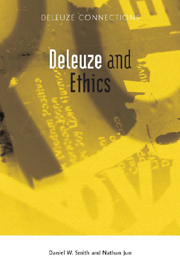Book contents
- Frontmatter
- Contents
- Acknowledgments
- Introduction
- 1 Whistle While You Work: Deleuze and the Spirit of Capitalism
- 2 The Ethics of the Event: Deleuze and Ethics without Aρχή
- 3 While Remaining on the Shore: Ethics in Deleuze's Encounter with Antonin Artaud
- 4 Responsive Becoming: Ethics between Deleuze and Feminism
- 5 Deleuze, Values, and Normativity
- 6 Ethics and the World without Others
- 7 Deleuze and the Question of Desire: Towards an Immanent Theory of Ethics
- 8 “Existing Not as a Subject But as a Work of Art”: The Task of Ethics or Aesthetics?
- 9 Deleuze, Ethics, Ethology, and Art
- 10 Never Too Late? On the Implications of Deleuze's Work on Death for a Deleuzian Moral Philosophy
- 11 Ethics between Particularity and Universality
- Notes on Contributors
- Index
6 - Ethics and the World without Others
Published online by Cambridge University Press: 12 September 2012
- Frontmatter
- Contents
- Acknowledgments
- Introduction
- 1 Whistle While You Work: Deleuze and the Spirit of Capitalism
- 2 The Ethics of the Event: Deleuze and Ethics without Aρχή
- 3 While Remaining on the Shore: Ethics in Deleuze's Encounter with Antonin Artaud
- 4 Responsive Becoming: Ethics between Deleuze and Feminism
- 5 Deleuze, Values, and Normativity
- 6 Ethics and the World without Others
- 7 Deleuze and the Question of Desire: Towards an Immanent Theory of Ethics
- 8 “Existing Not as a Subject But as a Work of Art”: The Task of Ethics or Aesthetics?
- 9 Deleuze, Ethics, Ethology, and Art
- 10 Never Too Late? On the Implications of Deleuze's Work on Death for a Deleuzian Moral Philosophy
- 11 Ethics between Particularity and Universality
- Notes on Contributors
- Index
Summary
There are numerous ways in which the thought of Gilles Deleuze might be aligned with a generally recognizable form of ethics: from Deleuze's beautiful Nietzschean meditations in Spinoza: Practical Philosophy on the ethics of good and bad forces as opposed to the morality of Good and Evil (Deleuze 1988: 17–29), to Foucault's famous designation of Deleuze and Guattari's Anti-Oedipus as a “book of ethics, the first book of ethics to be written in France in quite a long time” (Deleuze and Guattari 1983: xv), to the late profoundly ethical reflections on conceptual personae, philosophical friendship, and even an ethics of “life” (Deleuze and Guattari 1994). This is not to mention the Stoic dictum from The Logic of Sense “not to be unworthy of what happens to us” (Deleuze 1990: 149). While it is specifically the early single-authored work from the late 1960s that will be under consideration here, at issue is a notion of ethics that arguably might not be recognized as such at all, or as in any way resonant with Deleuze. The ethics in question here – what will at times be labeled an “anethics” – is stranger and darker than the more palatable examples listed above, an ethics more in resonance with Lacan as well as with a certain structuralist imperative.
- Type
- Chapter
- Information
- Deleuze and Ethics , pp. 108 - 122Publisher: Edinburgh University PressPrint publication year: 2011

